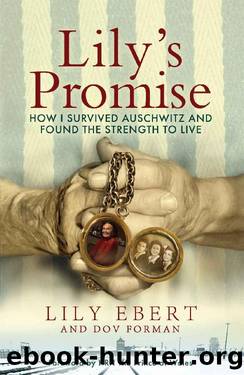Lily's Promise by Lily Ebert

Author:Lily Ebert [Ebert, Lily]
Language: eng
Format: epub
Publisher: Pan Macmillan UK
Published: 2021-09-13T16:00:00+00:00
July 1945âJune 1946
The Red Cross also broadcast the names of all the orphans from Buchenwald on the radio. Our story was on newsreels. And as a result, to our joy and astonishment, we discovered two relatives who not only had survived but were actually in Switzerland. Bella Brick was one of my fatherâs many first cousins, younger than him, but a lot older than me, so we called her Auntie Bella. Her husband, Max, or Uncle Miksha as we knew him, was a teacher. They didnât have children themselves, but they had travelled with a niece, Dita Engelman, and were now taking care of her in their new home in Geneva.
As soon as they could, they came to visit us in the mountains. An incredible day. To see a relative from Bonyhád, people who had known us all our lives . . . We could hardly believe our eyes. And we were amazed to hear their story of survival, although itâs now a famous one, and also very controversial.
Late on that Friday night at the end of June the previous year, after our mother had washed our hair and lit the Shabbat candles for us for the very last time on the sports field on the edge of Bonyhád, Bella, Miksha and Dita had boarded a train in Budapest. Half an hour after midnight, thirty-five goods wagons left Budapest, filled with nearly 1,700 passengers chosen for rescue by the Budapest Aid and Rescue Committee: Zionists, Orthodox and ultra-Orthodox Jews; rabbis, scholars, artists, farmers, industrialists, nurses. Rudolf Kasztner, the Committeeâs founder, who made the bargain with Adolf Eichmann, described it as a âNoahâs Arkâ. The plan was to save Hungaryâs Jews from the Final Solution through ransom, and at first the Committee hoped to âbuyâ 10,000 Jews. âBlood for Goodsâ. Some saw this as a form of collusion. It seems the Bricks had enough money to pay for three places on Kasztnerâs train. They had no idea where they were going â neither did Kasztner when the train left the station â but they knew that almost anywhere was safer than Hungary by then. Itâs possible they had already sent money for safekeeping in a Swiss bank. Their transport stopped at the Austrian border, and then Eichmann diverted the train to Bergen-Belsen. It finally arrived there on 9 July, the same day that our own transport reached Auschwitz.
The passengers were taken to a special part of the concentration camp, called the Ungarnlager, the Hungarian camp, where they had little to eat, and lived crammed into a few rooms. But they could organize themselves. They even had concerts and lectures and put on sketch shows. My cousins were particularly lucky: after about six weeks, they were allowed to leave, in a group of just 300, though most of the rest of the group were trapped at Bergen-Belsen until December. Bella, Miksha and Dita arrived in Switzerland on 18 August 1944. They were saved. And they were wealthy enough to build new lives for themselves.
Download
This site does not store any files on its server. We only index and link to content provided by other sites. Please contact the content providers to delete copyright contents if any and email us, we'll remove relevant links or contents immediately.
Machine Learning at Scale with H2O by Gregory Keys | David Whiting(4265)
Never by Ken Follett(3887)
Harry Potter and the Goblet Of Fire by J.K. Rowling(3815)
Unfinished: A Memoir by Priyanka Chopra Jonas(3357)
Fairy Tale by Stephen King(3313)
The Man Who Died Twice by Richard Osman(3043)
Will by Will Smith(2878)
Rationality by Steven Pinker(2331)
The Dark Hours by Michael Connelly(2283)
Can't Hurt Me: Master Your Mind and Defy the Odds - Clean Edition by David Goggins(2281)
It Starts With Us (It Ends with Us #2) by Colleen Hoover(2262)
The Storyteller by Dave Grohl(2200)
Friends, Lovers, and the Big Terrible Thing by Matthew Perry(2188)
The Dawn of Everything: A New History of Humanity by David Graeber & David Wengrow(2160)
The Becoming by Nora Roberts(2160)
The Stranger in the Lifeboat by Mitch Albom(2096)
Cloud Cuckoo Land by Anthony Doerr(2063)
Love on the Brain by Ali Hazelwood(2028)
Einstein: His Life and Universe by Walter Isaacson(1989)
